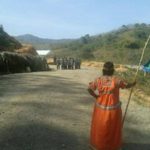 On the first of September tensions in Panama heightened when heavy machinery moved very close to the Ngöbe-Bugle Comarca to complete the highly contested Barro Blanco hydro dam, which is registered under the UN’s Clean Development Mechanism. This was preceded by the forceful eviction of indigenous people camping next to the construction area by the national police. In response to a letter sent by Panamanian civil society groups, the CDM Board has now reminded Panama about its right to withdraw approval for the project, “if it deems appropriate”.
On the first of September tensions in Panama heightened when heavy machinery moved very close to the Ngöbe-Bugle Comarca to complete the highly contested Barro Blanco hydro dam, which is registered under the UN’s Clean Development Mechanism. This was preceded by the forceful eviction of indigenous people camping next to the construction area by the national police. In response to a letter sent by Panamanian civil society groups, the CDM Board has now reminded Panama about its right to withdraw approval for the project, “if it deems appropriate”.
In February 2015, Panama decided to temporarily suspend the 95% complete construction of the Barro Blanco hydroelectric dam because of non-compliance with national environmental impact assessment requirements, including shortcomings in the agreement with the locally affected indigenous communities. In parallel, a dialogue roundtable was set up between the Panamanian State and local communities, to discuss the compatibility of the dam with national laws and human rights. Until now, this process failed to succeed in finding a solution that satisfies all parties.
In a letter leaked to the media earlier this year, European lenders undermined the negotiations by threatening the Panamanian government to go ahead with the project. This conduct was disavowed in May, following the publication of the Independent Complaints Mechanism (ICM) of the European banks first report. Following a complaint filed by M-10, a group representing the indigenous Ngöbe peoples, the ICM concluded that the banks violated their own policies by failing to adequately assess the risks to indigenous rights and the environment before approving a US$50 million loan to the project manager.
The report has delivered little and during the last three months, tension in the region have increased significantly. Faced with the government’s refusal to cancel Barro Blanco, the Ngöbes people peacefully protested and managed to temporarily block the entrance of the construction site. Tensions reached their peak on July 25, when Ngöbes, including women and children, were arrested and injured, as they were blocking a road. In an attempt to split the Ngöbes movement, the government found an agreement to resume negotiations with some Ngöbes representatives on August 10. The accord states that the construction can be completed but that the reservoir won’t be flooded until a final agreement has been reached between the parties. The affected communities strongly opposed the agreement and continue to protest.
In July local groups sent a letter to the CDM Board, to inform them about the situation and to ask them to take action. The letter urges the Board to push for the establishing of a grievance mechanism, coordinate with financing banks, launch a separate investigation to ensure compliance with the current CDM rules and follow up with the national authorities. In its response to the letter, the CDM Board recalled that it adopted a procedure that allows a host country’s Designated National Authority (DNA) to withdraw approval/authorization for the project. More importantly, the Board conducted a follow up with Panama and forwarded the letter, reminding them withdrawal procedure. The fate of Barro Blanco hydro dam project is firmly in the hands of the government of Panama. Never the less UNFCCC Parties including Netherlands and Germany must step beyond the investments and seek a responsible outcome that will prevent and repair the human rights violations committed during the construction of this dam.
Barro Blanco is yet another sad example of why it is essential that project-affected peoples have the right to seek recourse when CDM project activities cause harm to communities and the environment. For further reading see our latest policy brief: Social and environmental accountability of climate finance instruments.






